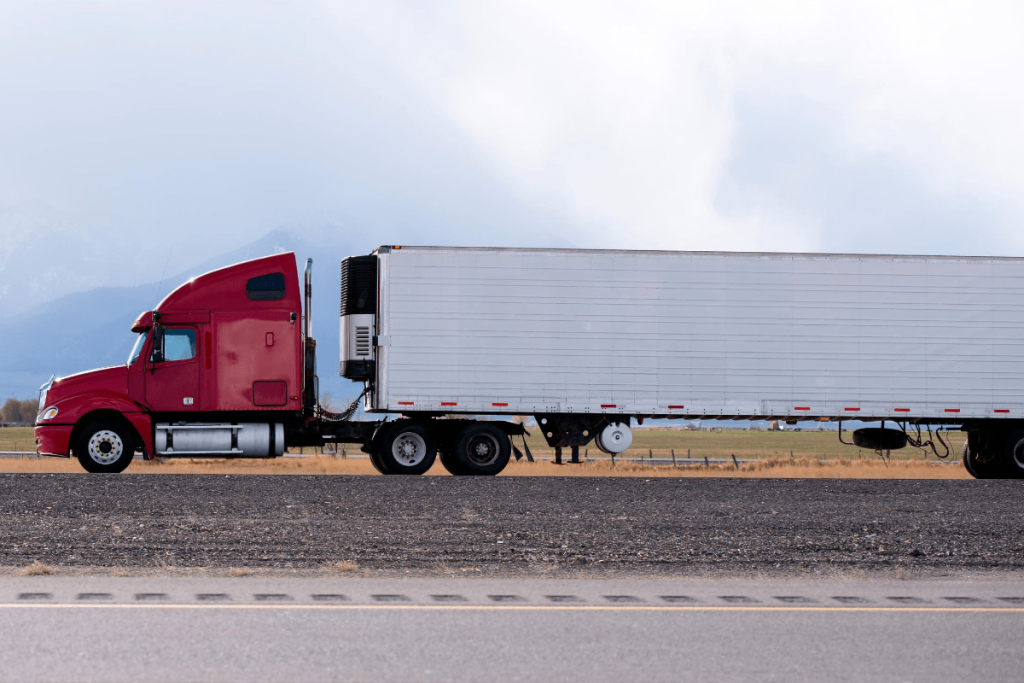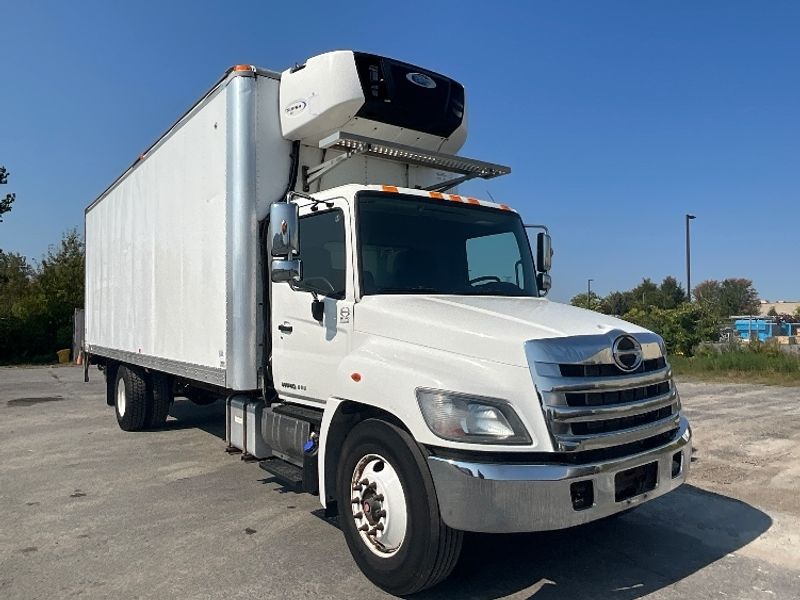Advanced Thermo King Truck Refrigeration Units for Trusted Delivery
Advanced Thermo King Truck Refrigeration Units for Trusted Delivery
Blog Article
Top Developments in Transportation Refrigeration: Enhancing Effectiveness and Safety
The landscape of transport refrigeration is undergoing significant makeover, driven by developments focused on improving both efficiency and security. Key innovations such as clever temperature level surveillance systems, eco-friendly refrigerants, and automated path optimization are crucial in dealing with the sector's challenges. These technologies not only make certain the honesty of temperature-sensitive items yet likewise add to sustainability efforts. As these technologies continue to develop, it is important to discover their ramifications on functional techniques and governing compliance, prompting a closer evaluation of how they reshape the future of transport refrigeration.
Smart Temperature Level Keeping An Eye On Equipments
In the world of transportation refrigeration, wise temperature level tracking systems have actually become an important development for making sure the honesty of temperature-sensitive products. These advanced systems take advantage of Web of Things (IoT) technology to provide real-time information on temperature level changes, allowing drivers to maintain optimal problems throughout the supply chain. By continuously tracking the temperature level of cooled containers and lorries, business can quickly recognize discrepancies that may compromise product high quality.

Additionally, smart tracking systems frequently integrate automated signals and notifications, permitting stakeholders to respond immediately to any type of prospective problems. This proactive method not just decreases the risk of spoilage however likewise improves compliance with regulative standards governing food safety and security and pharmaceutical transport.
The integration of information analytics within these systems additionally facilitates anticipating upkeep, assisting drivers to anticipate potential equipment failures prior to they occur. This ability decreases downtime and enhances operational performance, inevitably leading to cost savings.
Eco-Friendly Refrigerants
Smart temperature monitoring systems play a vital role in preserving product top quality, but the efficiency of transport refrigeration likewise pivots on the selection of refrigerants utilized. As ecological concerns increase, the change towards environment-friendly cooling agents has become vital. Typical refrigerants, such as hydrofluorocarbons (HFCs), are well-known for their high Global Warming Prospective (GWP), adding dramatically to climate change. In comparison, emerging alternatives like hydrocarbon-based cooling agents and hydrofluoroolefins (HFOs) existing reduced GWP alternatives, using both efficiency and sustainability.
These green cooling agents not only decrease ecological impact but also straighten with international guidelines focused on phasing out damaging substances. Their adoption can cause enhanced power performance, inevitably lowering operating expenses for transport refrigeration systems. The use of all-natural refrigerants, such as ammonia and carbon dioxide, has actually obtained traction due to their superb thermodynamic properties and lower environmental footprint.
Investing in environmentally friendly refrigerants is not just a regulative conformity step; it represents a strategic decision that enhances brand online reputation and promotes client loyalty. thermo king transport refrigeration. By prioritizing sustainable practices, firms can add to a greener future while guaranteeing the honesty of transferred items
Advanced Insulation Materials
Using sophisticated insulation materials is crucial for enhancing transport refrigeration systems, as they considerably enhance energy performance and preserve regular temperature control. Conventional insulation approaches typically fall brief in preventing thermal transfer, bring about increased power intake and changing temperatures within cooled areas.
Arising materials such as vacuum protected panels (VIPs) and aerogels provide superior thermal resistance, allowing for thinner accounts without jeopardizing efficiency. VIPs, as an example, make use of a vacuum cleaner layer to lessen convective and conductive warmth transfer, making them ideal for space-constrained applications. Aerogels, known for their porous and lightweight structure, offer exceptional insulation while substantially decreasing total system weight.
Moreover, incorporating stage change products (PCMs) into insulation systems can additionally maintain temperature levels throughout transit. These products soak up and release thermal energy, efficiently buffering versus external temperature variations.
The integration of these sophisticated insulation products not only minimizes the operational prices related to power usage however also expands the service life of temperature-sensitive items. As the transport refrigeration market remains to advance, the fostering of ingenious insulation modern technologies will click be pivotal in enhancing both efficiency and safety in refrigerated transportation.
Automated Course Optimization
The effectiveness of transportation refrigeration systems is significantly boosted via automated path optimization, which leverages innovative algorithms and real-time data to establish one of the most reliable paths for distribution. By examining different variables such as website traffic patterns, weather conditions, and delivery home windows, these systems can substantially reduce traveling time and fuel intake.
Automated path optimization decreases human mistake and subjective decision-making, which can bring about inefficiencies. This innovation enables fleet supervisors to designate resources more properly, ensuring that refrigerated goods keep their needed temperature level throughout the journey. By maximizing paths, firms can also enhance consumer satisfaction with timely shipments.
Additionally, automated systems can adapt to unanticipated scenarios, such as roadway closures or abrupt website traffic spikes, enabling dynamic rerouting. This versatility not only secures the integrity of temperature-sensitive items but additionally contributes to total operational effectiveness.
Carrying out automated route optimization can lead to substantial price financial savings while decreasing the carbon impact connected with transportation. As companies increasingly prioritize sustainability, this development stands apart as a crucial part in contemporary transportation refrigeration, aligning operational objectives with ecological obligation. Eventually, automated course optimization represents a considerable innovation in the quest for effectiveness and security in transportation refrigeration.

Real-Time Information Analytics
Automated course optimization substantially benefits from the integration of real-time data analytics, which gives critical insights into the performance of transport refrigeration systems. By utilizing real-time data, transportation drivers can keep track of temperature level variations and equipment performance, ensuring that subject to spoiling goods are preserved within needed parameters throughout transit. This aggressive strategy not only boosts the top quality of the delivered products yet likewise alleviates the danger of putridity and loss.

In enhancement to improving efficiency, real-time analytics improves safety and security by ensuring compliance with regulative criteria for this temperature control. This not just secures public wellness but likewise fortifies a business's reputation - thermo king truck refrigeration units. As the transport refrigeration industry progresses, the integration of real-time information analytics emerges as a keystone for driving development, sustainability, and operational quality
Verdict
In verdict, the innovations in transport refrigeration substantially improve both effectiveness and safety within the market. Collectively, these developments represent a critical development in transportation refrigeration, making certain conformity with regulatory standards and advertising a greener future.
The landscape of transportation refrigeration is undergoing substantial transformation, driven by technologies intended at enhancing both efficiency and safety.Smart temperature level tracking systems play a vital function in preserving product quality, yet the effectiveness of transport refrigeration additionally hinges on the choice of cooling agents utilized. Their fostering can lead to enhanced power effectiveness, eventually reducing operating prices for transportation refrigeration systems. Ultimately, automated route optimization stands for a substantial development in the mission for effectiveness and safety and security in transport refrigeration.
In conclusion, the developments in transport refrigeration considerably enhance both efficiency and security within the sector.
Report this page